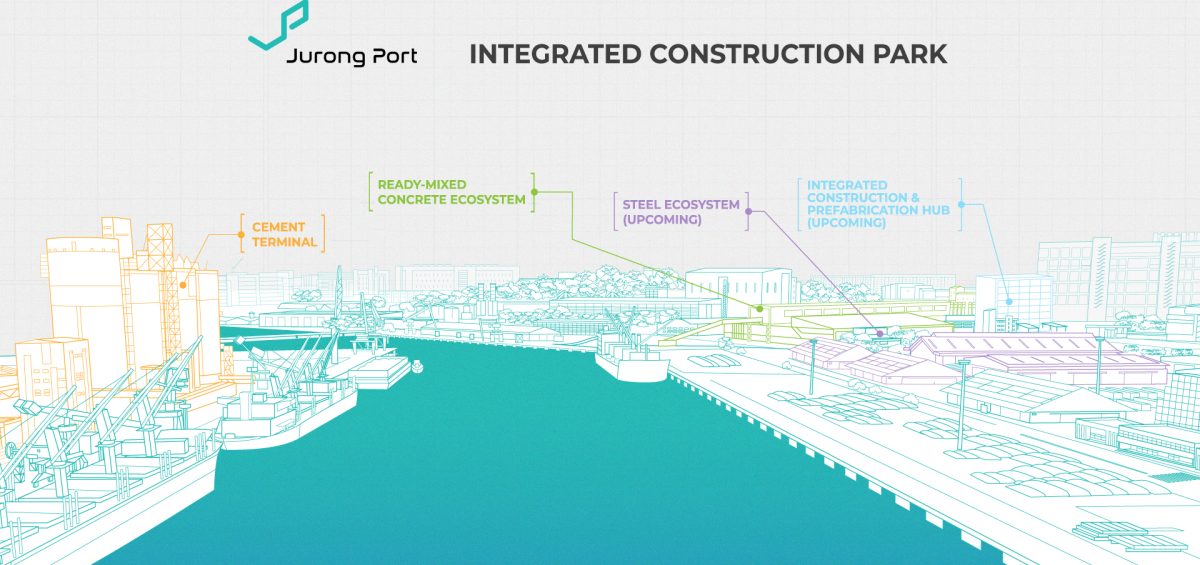- Jurong Port (JP) brings partners together to collaborate and innovate for a unique Integrated Construction Park (ICP) that combines the efficient discharge of construction inputs with downstream construction-related activities, thereby improving productivity, reducing carbon emissions and optimising land use.
- RMC Ecosystem is the latest but not the last element in the ICP. An Integrated Construction and Prefabrication Hub (ICPH) is next in line.
Singapore, 27 November 2024 – Jurong Port, Singapore’s premier gateway for general and bulk cargo, celebrated the official opening of Ready-Mixed Concrete (RMC) Ecosystem today in an event officiated by Mr Desmond Lee, Minister for National Development. The opening of the RMC Ecosystem marks a significate milestone and brings JP closer to its vision of developing a distinctive Integrated Construction Park (ICP) next to the waterfront.
Jurong Port’s strategic location at the nexus of the construction supply chain, coupled with its public port status and expertise in port logistics, makes it a natural choice for developing a comprehensive ICP. This unique ICP will integrate JP’s existing cement terminal, the new RMC Ecosystem, and the future ICPH.
As the key landing point for seaborne importation of vital construction materials, locating the ICP at Jurong Port enables the aggregation of raw materials like cement, construction aggregates (sand and granite) and steel. Such a set-up facilitates the seamless manufacturing of precast components and modules within the port. By housing different construction facilities such as terminals, storage yards and ready-mixed concrete batching plants together, JP enhances the collaboration among key players in the built environment sector, optimising land use and integrating synergistic activities into a comprehensive construction park.
The RMC Ecosystem enables the efficient discharge of construction inputs directly into a cluster of downstream construction-related activities. It also creates economies of scale, enabling common non-core activities to be pooled into shared services, for example centralised recycling, truck washing and logistics planning. The pooling of such services will substantially lower costs and facilitate adoption of new technologies, hence allowing sector players to focus on their core business activities – such as batching concrete – and increase their competitiveness. A total of 11 aggregate plots, comprising of six (6) plots at the common storage area and five (5) plots integrated with RMC plants, have been fully occupied by nine local companies.
“Jurong Port is encouraged by the industry’s support for our RMC project. This success reflects the industry’s trust in our commitment to enhance productivity, resilience and sustainability for the construction supply chain. We did not undertake this transformative journey on our own, but worked closely with various government agencies and industry partners to collectively innovate, revamp, and relocate a well-entrenched RMC supply chain to be adjacent to the waterfront.” said Terence Seow, Chief Executive Officer of Jurong Port.
The RMC Ecosystem is just the beginning of Jurong Port’s transformative journey. To develop a truly comprehensive ICP, Jurong Port will follow up with additional projects, such as the ICPH and steel terminal, which will further benefit the construction sector and our nation.
Located adjacent to the RMC Ecosystem, the ICPH utilises a multi-tenancy model that increases land utilisation. This highly optimised facility eliminates the need for precasters to invest in their own precasting facilities. In carrying out their assembly line operations, individual tenants do not need to cater for steel fabrication and RMC batching. Instead, they can directly source for ready-mixed concrete from the neighbouring RMC Ecosystem and steel stored in Jurong Port. This allows them to focus on producing prefabricated building components. For the ICPH project, three local precasters have expressed interest, taking up three of the four floors.





